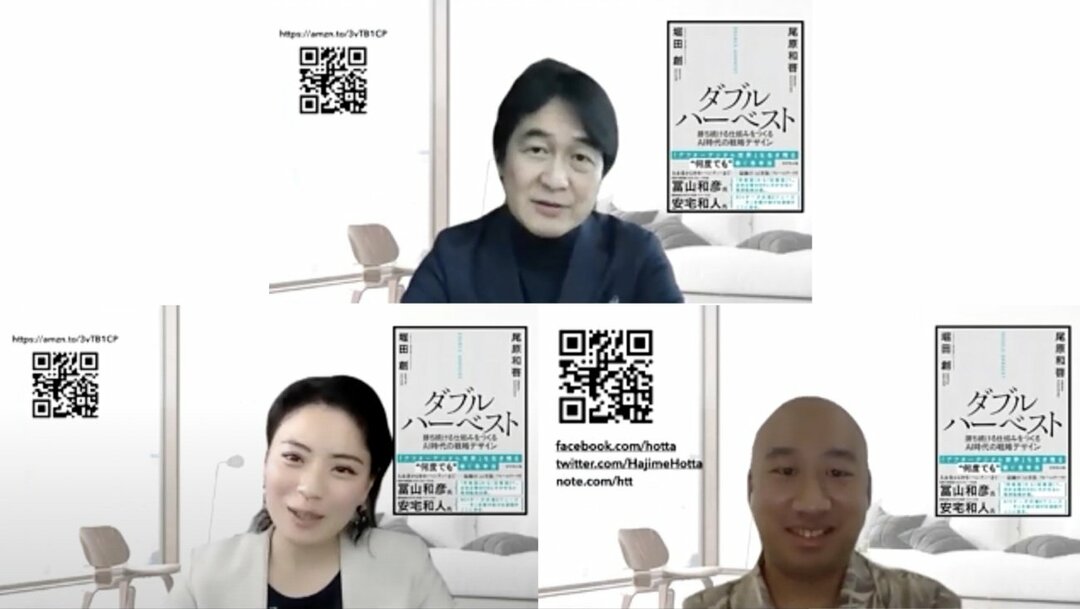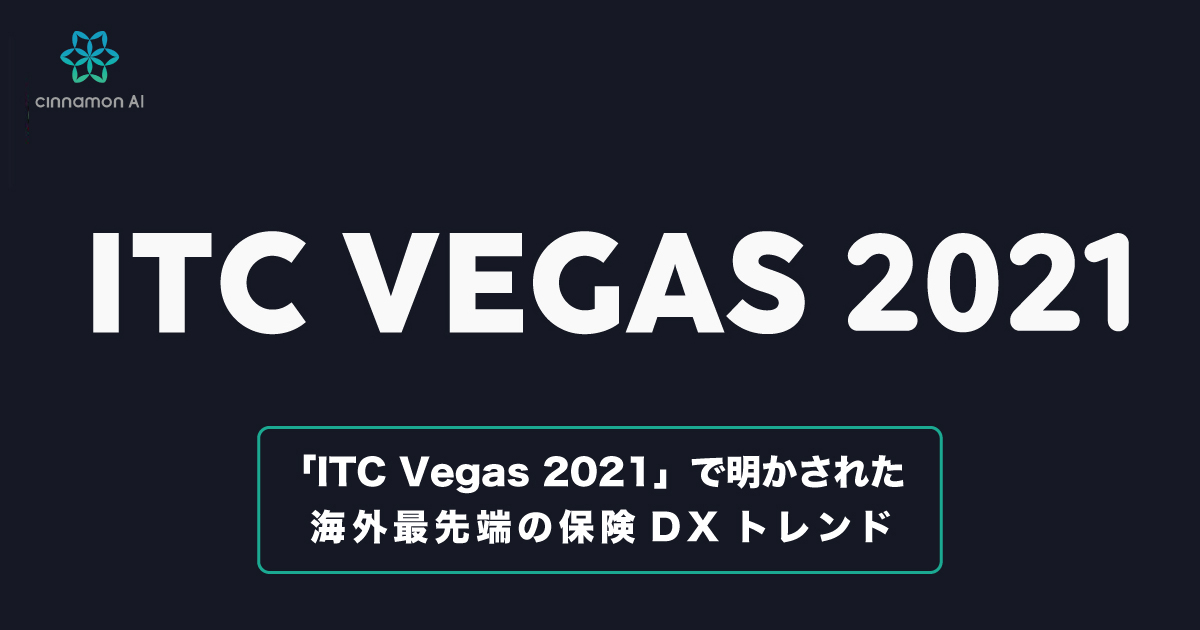
blog cinnamon blog

- event
What companies that do DX with “departmental budgets” will regret after 3 years [Guest: Tsuyoshi Natsuno] (Part 1)

*This article is reprinted with permission from Diamond Online.
As co-founder of Cinnamon AI, Hajime Hotta provides AI solutions to many companies and promotes DX in Japan, and leads the IT industry with numerous bestsellers including ``After Digital'' and ``Online Business Evolution''. ``Double Harvest: Strategic Design in the AI Era to Create a System for Continued Winning'' (Diamond Publishing), co-authored by Kazuhiro Ohara, has been published. This book, which was compiled with the strong thoughts that ``If things continue like this, Japan will become a digitally underdeveloped country'' and ``I want Japan to become an AI-advanced country,'' was ranked number one in Amazon's business books immediately after its release, and became a top runner in various industries. It is said to have received great praise from people as well.
What is a "harvest loop" that grows and harvests data? What does it mean to spin it twice? We invited Mr. Tsuyoshi Natsuno, the representative of Dwango, who considers himself the oldest person in the IT industry, as a guest, and talked with Mr. Tsuyoshi Natsuno, the representative of Dwango, who is the representative of Cinnamon AI, about the things to keep in mind when promoting company-wide DX using AI, the hurdles to overcome, and the points that are easy to make. I listened to it with Mirai Hirano (composition: Yukihiro Tanaka).

AI will not be useful unless the entire “business ecosystem” is designed.
Hajime Hotta (hereinafter referred to as Hotta): 『double harvestTo commemorate the publication of ``'', we invited Tsuyoshi Natsuno. I would like to talk with Mr. Hirano, the representative of Cinnamon AI, about various things. Thank you for your continued support today.
Tsuyoshi Natsuno (hereinafter referred to as Natsuno):This is Natsuno. I've been in the IT industry for about 25 years now, and I think I'm close to being the oldest person there, but the big thing that has changed over the past few years is that computing power and network capabilities have increased, and the cloud era has truly arrived. . This is also a huge tailwind for AI (artificial intelligence).
However, even though Japan has a well-developed communication network and many applications, it is one, two, or even three laps behind the rest of the world. Against this backdrop, Japan's future depends on how seriously it can utilize AI. I also work on government committees and corporate management, and my mission in life is to further utilize technology in various situations.
Mirai Hirano (hereinafter referred to as Hirano):This is Hirano, the representative of Cinnamon AI. I myself have been researching AI for over 15 years, and started a business using AI when I was a student, but at the time, no one was interested in AI, so it quickly failed. Because of this experience, I am amazed that AI is currently attracting attention and that DX (digital transformation) is becoming a boom in the world.
On the other hand, even though AI and DX are gaining momentum, most of the discussion has stopped at "cost reduction" and considering the current situation where we cannot foresee the future, we need to make even more changes. So, this time ``double harvestI am very happy that `` is receiving such a great response.
Hotta:This time, we will talk with IT critic Kazuhiro Ohara about “double harvestThe reason I wrote this article is because, from the perspective of us AI engineers, we are far from the idea of using AI to change the way we work or the way companies operate, and we are far from the idea of using AI to change the way we work or the way companies operate. I gave up on it, thinking, ``That's about it,'' and before that, there were many people who said, ``AI is still early,'' and ``It doesn't matter to me,'' and I thought that it would be bad if things continued as they were.
Therefore, I published a book that systematically summarizes how to incorporate AI into business, but the big message is that it is not about how to utilize the data that already exists, but rather about how to incorporate AI into daily work. We propose creating a cyclical structure, a harvest loop, in which AI takes in data for learning, uses that data to evolve AI, and uses that AI to accumulate further data.
Natsuno:I am also working on several AI-related projects, and what I feel is that AI is like an "ecosystem." AI is not something that becomes effective immediately after it is created, but its accuracy gradually improves as it is used in circles. and adapt to new situations as they arise. In that sense, I think it is important to incorporate AI systems into daily work.
Rather than just analyzing accumulated data and deriving results, new analyzes are performed from the data generated during the normal business flow or as a result of users using our services, and this results in new actions. is changing. Incorporating AI into that flow is exactly the Harvest Loop idea, and it fits very well.
Up until now, both those who develop systems and those who place orders have had an ingrained mindset of simply receiving a deliverable and being done with it, so it has been difficult to get used to the development method of gradually increasing accuracy as the work progresses. That's right.
Hotta:Since the method of development will be different from the past, both managers and employees will need to drastically change their way of thinking.
Natsuno:When I look at various projects, I realize that there are many people who seek short-term benefits from AI. There are many people who try it and quickly decide that something is wrong or that it can't be used at all. The idea of constantly tuning and creating loops according to the situation is completely different from conventional system development, so humans have not been able to adapt.
In fact, I am currently trying to create a loop at KADOKAWA and Dwango, which I am involved in management. At that time, rather than making judgments based only on the results of each department or domain, we should also consider what results, in what form, and what impact they would have on the entire group when averaged over the total, and how they would look from a big-picture perspective. I try to watch it.
Hotta:wonderful. It's amazing that you are conscious of not only the business layer but also the loop of management as a whole.
You don't have to give up and think, "We don't have the data, so we can't use AI..."
Natsuno:However, it still takes time to make data available through the API and for it to start working properly. Honestly, I feel like it will take three years. Recently, we have finally started to see results, and the mindset of the people participating in the project has changed. We will also be able to flexibly change the basic design. What I have learned so far is that this is very important.
Hotta: I also think that it is essential to implement a harvest loop with a vision over a long span of three or five years.
plain: 『double harvestWhat I like most about ``Data can be obtained later'' is the idea. It is common to think, ``How can we use the data we currently have?'' However, this can lead to thinking, ``We can't do anything because we don't have that data.'' Another thing is that people have the impression that AI is difficult to get started with, but I also like the fact that you can start small.
To use a familiar example, when you make a voice call on Facebook Messenger, a pop-up appears after the conversation ends asking if there was a problem with the call. Facebook is accumulating response data and can see in what environments the quality of calls deteriorates. It is because of this kind of loop that we are able to provide a better UX (user experience) to our users.
At Cinnamon AI, we also draw a harvest loop and provide AI solutions to our customers. For example, a logistics trading company would like to see a world where customers can receive products as soon as they want them. Therefore, AI is used for demand forecasting, warehouse layout, and how to handle as many products as possible. This is a case of triple loops.
For example, there are manufacturers who listen to customer feedback, but they don't incorporate it into product design. If we create a system where information is immediately communicated through a harvest loop, we will be able to create products that better meet customer needs. There have been cases like this.
Hotta:I feel that there is a growing awareness that it is important to create a cyclical structure. On the other hand, DX is currently attracting attention, but what is your view on the current state of DX in Japan?
Natsuno: There are many managers who say, ``Just do DX'' or ``DX is important,'' but DX is just a means, not an end. Many people don't see that. What is important is how people's work flows and organizational designs will change as a result of digitalization, and even if we just introduce technology without thinking about it, it will not work in the end. Nothing changes.
In that sense, the current situation with the coronavirus pandemic is a tailwind, or rather a good turning point to rethink things from the ground up. To begin with, remote work itself is changing the way we work, and to do so we have no choice but to use digital tools. In the name of DX, it is common for people to try new ways of working, and we are accumulating knowledge about which ones worked. That's very good.
Managers who do not understand DX tend to settle for “departmental budgets”
Natsuno:However, in order for such changes to take hold, understanding from top management is essential. For example, even if budget measures are taken, it will take some time to prove that the loop will work properly when using AI to fundamentally reform business operations.
However, if the development costs during that period are added to the budget of a specific department, the costs will simply increase, and the staff will not want to move forward. So, it needs to be done in the president's budget. It is very important to be able to say to the workplace, ``You don't have to worry about spending because it's the management's budget. Please allocate enough engineering personnel.''
I think it can be done if managers understand the essence of DX, but managers who do not understand it cannot make such decisions. If you can't do it, I think it means that there are still many business owners who don't understand it.
Hotta:DX is a means, and what we aim for in the end, the so-called purpose, is another issue. For example, if you have a clear purpose of ``dramatically improving the customer experience,'' you can deliver a consistent message from there.
On the other hand, even when we propose Harvest Loop to companies where the company's purpose is not clearly visible or has not been fully established, we have experienced several times that there is a discrepancy somewhere. Whether it's DX or loops that utilize AI, purpose is probably the key.

| Takeshi NatsunoPhoto: top President and Representative Director of Dwango Co., Ltd./Special Invited Professor, Graduate School of Media and Governance, Keio University Graduated from Waseda University, Faculty of Political Science and Economics, joined Tokyo Gas. Graduated from the University of Pennsylvania Graduate School of Business (Wharton School). After serving as vice president of a venture company, joined NTT Docomo. He launched many services such as ``i-mode'' and ``Osaifu-Keitai'' and served as an executive officer of Docomo. Currently, in addition to being a special guest professor at Keio University, he also serves as the president of Dwango Inc., the chairman of MovieWalker Inc., and a director of KADOKAWA, transcosmos, SEGA SAMMY Holdings, GREE, USEN-NEXT HOLDINGS, and Oracle Japan. In addition, he also serves as the project manager for the Ministry of Economy, Trade and Industry's unexplored IT human resources discovery and development project, as a consultant on the Tokyo Organizing Committee for the Olympic and Paralympic Games, and as a member of the Cabinet Secretariat Regulatory Reform Promotion Council. |
| Miku HiranoPhoto: Bottom left Cinnamon AI representative Serial entrepreneur. Completed graduate school at the University of Tokyo. Engaged in research on recommendation engines, complex networks, clustering, etc. It was twice selected for the IPA Unexplored Software Creation Project in 2005 and 2006. Founded Naked Technology while still in school. Develops and operates middleware that allows you to develop apps on iOS/Android/flip phones. In 2011, the company was sold to Mixi. She has received many awards both domestically and internationally, including ST.GALLEN SYMPOSIUM LEADERS OF TOMORROW, FORBES JAPAN "Entrepreneur Ranking 2020" BEST10, Woman of the Year 2019 Innovative Entrepreneur Award, VEUVE CLICQUOT BUSINESS WOMAN AWARD 2019 NEW GENERATION AWARD. He has also given a keynote speech at AWS SUMMIT 2019, Milken Institute Japan Symposium, 45th Japan-ASEAN Management Conference, Bloomberg THE YEAR AHEAD Summit 2019, etc. Since 2020, he has been appointed as a member of the Cabinet Secretariat IT Strategy Office and a special member of the Cabinet Office Tax Investigation Committee. From 2021, he will serve as an expert member of the Cabinet Office's Economic and Fiscal Policy Council. Mother of two children. |
| Hajime HottaPhoto: Bottom right Cinnamon Co., Ltd. Executive Officer/Futurist Born in 1982. Since his student days, he has been consistently engaged in artificial intelligence research such as neural networks, and at the age of 25 completed the doctoral program at Keio University Graduate School of Science and Engineering (Doctor of Engineering). Selected for the "IPA Unexplored Software Creation Project" in 2005 and 2006. Joined Sirius Technologies in 2005 and was responsible for the development of AdLocal, a location-based advertising distribution system. After founding Naked Technology while in school, he sold the company to mixi. Furthermore, he co-founded Cinnamon AI, the hottest AI startup that provides artificial intelligence business solutions such as AI-OCR, speech recognition, and natural language processing (NLP). Currently, he is active as a futurist at the company and is in a position to lead talented engineers in Southeast Asia. In addition, based on our philosophy of ``continuing to be an ally of innovators,'' we also provide advisory and coaching sessions for managers and leaders. While referring to the knowledge of cognitive science, we are exploring methodologies to increase the effectiveness of people and organizations. Lives in Malaysia. 『double harvest' is his first book. |
Reprinted from: Diamond Online / Tsuyoshi Natsuno https://diamond.jp/articles/-/269476
"Double Harvest"
Click here for book details and publicationhereYou can check from here.
Continued to the second part:Managers who don't understand DX and startups who can't use AI should leave [Guest: Tsuyoshi Natsuno] (Part 2)
Recommended articles
-
 event
event -
 event
eventOverseas cutting-edge insurance DX trend web revealed at “ITC Vegas 2021”…
Overseas cutting-edge insurance DX trend webinar revealed at “ITC Vegas 2021”…
-
 event
event[5 days only] Double Harvest Summit, archive distribution public page
[5 days only] Double Harvest Summit, archive distribution public page
